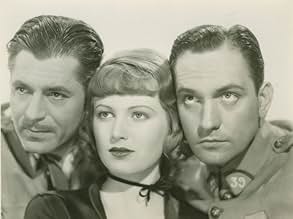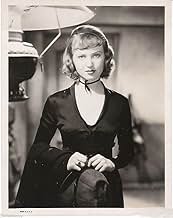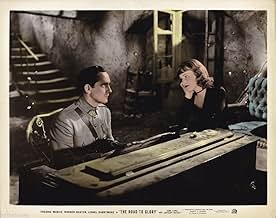NOTE IMDb
6,9/10
659
MA NOTE
Ajouter une intrigue dans votre langueThe story of trench life during World War I through the lives of a French regiment. As men are killed and replaced jaunty Lt. Denet becomes more and more somber. His rival for the affection ... Tout lireThe story of trench life during World War I through the lives of a French regiment. As men are killed and replaced jaunty Lt. Denet becomes more and more somber. His rival for the affection of nurse Monique is Capt. La Roche.The story of trench life during World War I through the lives of a French regiment. As men are killed and replaced jaunty Lt. Denet becomes more and more somber. His rival for the affection of nurse Monique is Capt. La Roche.
- Réalisation
- Scénario
- Casting principal
- Récompenses
- 3 victoires au total
Raymond Aimos
- French Soldier
- (images d'archives)
- (non crédité)
Antonin Artaud
- French Soldier
- (images d'archives)
- (non crédité)
Avis à la une
In 1916, somewhere in the front in France in World War I, the 5th Company in the 2nd Battalion of the 39th Regiment created by Napoleon Bonaparte and leaded by the tough Captain Paul La Roche (Warner Baxter) receives among the replacements, Lieutenant Michel Denet (Fredric March) and private Moran (Lionel Barrymore). When Lt. Denet meets the nurse Monique La Coste (June Lang), who is Capt. La Roche's mistress but he does not know, they fall in love for each other. When Capt. La Roche sees the old Pvt. Moran in his inspection, he identifies his father using a fake identity. Meanwhile, the 39th Regiment receives order to go to the trenches, attack the German lines and install a telephone in the front to guide the artillery.
"The Road to Glory" is another great anti-war movie that shows the barbarian life in the trenches in WWI, using a dramatic triangle of love and father-son relationship in a time where the leader headed the attack and soldiers were just numbers. The direction of Howard Hawks and the screenplay are excellent, using adequate pace and lines such as "why do they have to die?" or the contradictory "the fear is just in the imagination" to support the anti-war message of the feature. The scenarios and cinematography depict the horror of the insanity of war in the bloody trenches. The performances of Warner Baxter, in the role of a harsh commander; Fredric March in the role of the ambiguous lieutenant divided between love and loyalty; Lionel Barrymore, in the role of a stubborn old soldier; and the gorgeous June Lang in the important role of a nurse also divided by her moral obligation with her lover and real love, are wonderful and credible. I am really impressed with the beauty of June Lang. My vote is seven.
Title (Brazil): "Caminho da Glória" ("Path of the Glory")
"The Road to Glory" is another great anti-war movie that shows the barbarian life in the trenches in WWI, using a dramatic triangle of love and father-son relationship in a time where the leader headed the attack and soldiers were just numbers. The direction of Howard Hawks and the screenplay are excellent, using adequate pace and lines such as "why do they have to die?" or the contradictory "the fear is just in the imagination" to support the anti-war message of the feature. The scenarios and cinematography depict the horror of the insanity of war in the bloody trenches. The performances of Warner Baxter, in the role of a harsh commander; Fredric March in the role of the ambiguous lieutenant divided between love and loyalty; Lionel Barrymore, in the role of a stubborn old soldier; and the gorgeous June Lang in the important role of a nurse also divided by her moral obligation with her lover and real love, are wonderful and credible. I am really impressed with the beauty of June Lang. My vote is seven.
Title (Brazil): "Caminho da Glória" ("Path of the Glory")
During the late 1920s-1930s, something unusual happened in Hollywood as well as Europe...films began to be released which depicted war as hellish. And, in these dramas set during WWI, there was a strong sense that the war was stupid and wasteful. Realistic? Absolutely...but far from the super-heroic look many later war films depicted.
"The Road to Glory" is about an outfit of French soldiers who are constantly given the roughest missions. Its leader, Captain LaRoche (Warner Baxter) seems tough and indifferent to his men's suffering...a brave front he puts on to deal with the impossible orders he's given. A new officer, Lt. Denet (Frederic March) is assigned to the unit. The film depicts both the suffering of the men as well as the woman that LaRoche and Denet both want.
The acting is very good in this one, which isn't surprising since March and Baxter are among the best (and most underrated) actors of the era. They're also helped along by many character actors who play various soldiers. Overall, with a gritty story and wonderful acting, this film is worth seeing....though I must warn you it's very depressing...which, if you think about it, it should be!
"The Road to Glory" is about an outfit of French soldiers who are constantly given the roughest missions. Its leader, Captain LaRoche (Warner Baxter) seems tough and indifferent to his men's suffering...a brave front he puts on to deal with the impossible orders he's given. A new officer, Lt. Denet (Frederic March) is assigned to the unit. The film depicts both the suffering of the men as well as the woman that LaRoche and Denet both want.
The acting is very good in this one, which isn't surprising since March and Baxter are among the best (and most underrated) actors of the era. They're also helped along by many character actors who play various soldiers. Overall, with a gritty story and wonderful acting, this film is worth seeing....though I must warn you it's very depressing...which, if you think about it, it should be!
I saw The Road To Glory for the first time in over 40 years and all I can say is it's the best film Howard Hawks ever did that no one really knows about. It is one of the great anti-war films of all time, it ranks up there in World War I films with Paths Of Glory and All Quiet On The Western Front. In fact this ought to be seen with Paths Of Glory back to back, first this one and then Paths Of Glory where you will understand completely what the French soldiers mutinied about.
Warner Baxter is the veteran captain who's been at the front for years and Fredric March is a lieutenant and relative newcomer who still has a jauntiness about him. Never mind that jauntiness is pretty well knocked out of March after a while.
Pretty nurse June Lang comes between them in a romantic complication to their relationship as veteran officer and relative newcomer. But Baxter has an additional problem, his father Lionel Barrymore, veteran of the Franco-Prussian War has enlisted and found his way to Baxter's outfit. In the beginning Baxter sends away an elderly volunteer. But Barrymore he does not because Baxter knows what it means to the old man.
But Barrymore does not know how much more deadly war has become since 1870. Poison gas, barbed wire, trenches where you lived as well as fought, and automatic weapon fire. It proves too much for him and it leads to tragedy for many in the cast.
Hawks's direction of the battle scenes is incredibly impressive. A lot of this footage was used in other films. And he gets grade A performances out of his cast, most impressive being Baxter and Barrymore.
Sadly this film is not out on DVD, I was lucky to get a copy to review. I hope TCM shows this one real soon so you will rave about it as I have done.
Warner Baxter is the veteran captain who's been at the front for years and Fredric March is a lieutenant and relative newcomer who still has a jauntiness about him. Never mind that jauntiness is pretty well knocked out of March after a while.
Pretty nurse June Lang comes between them in a romantic complication to their relationship as veteran officer and relative newcomer. But Baxter has an additional problem, his father Lionel Barrymore, veteran of the Franco-Prussian War has enlisted and found his way to Baxter's outfit. In the beginning Baxter sends away an elderly volunteer. But Barrymore he does not because Baxter knows what it means to the old man.
But Barrymore does not know how much more deadly war has become since 1870. Poison gas, barbed wire, trenches where you lived as well as fought, and automatic weapon fire. It proves too much for him and it leads to tragedy for many in the cast.
Hawks's direction of the battle scenes is incredibly impressive. A lot of this footage was used in other films. And he gets grade A performances out of his cast, most impressive being Baxter and Barrymore.
Sadly this film is not out on DVD, I was lucky to get a copy to review. I hope TCM shows this one real soon so you will rave about it as I have done.
This story is set during the trench warfare of World War 1. Captain Laroche (Warner Baxter) leads his troops in various sorties to the front line. On average, half of the platoon doesn't make it back. Lieutenant Denet (Fredric March) joins his platoon along with Private Morin (Lionel Barrymore). When not in the front line, both Denet and La Roche are in love with the same woman - Monique (June Lang). However, the war goes on....
This is a good film if a little depressing at times. I enjoyed the first half of the film more than the second half. There are good scenes, eg, the whole section when the troops are sent on duty for the first time - the man on the wire, the Germans digging underneath the trenches to plant explosives, the relief when their replacements arrive, and the moment when a relief soldier asks what it's like and is given the reply "you'll find out" - a few moments later when the troops are clear of danger, we have a very poignant moment. The film then involves itself in the love interest before returning to the action.
The acting from Warner Baxter and Fredric March is better than June Lang and Lionel Barrymore. In fact, Barrymore is quite annoying. No way would he have been allowed to join the soldiers let alone volunteer on a vital mission. I couldn't really feel any sympathy for him. Just like I cant feel any sympathy for do-gooder numbskulls who visit war-zones in the name of charity/aid, get captured and then get be-headed.
There is a dramatic twist at the end regarding the love triangle between Baxter, March and Lang, and, despite heroics, the overall effect of the film is downbeat.
This is a good film if a little depressing at times. I enjoyed the first half of the film more than the second half. There are good scenes, eg, the whole section when the troops are sent on duty for the first time - the man on the wire, the Germans digging underneath the trenches to plant explosives, the relief when their replacements arrive, and the moment when a relief soldier asks what it's like and is given the reply "you'll find out" - a few moments later when the troops are clear of danger, we have a very poignant moment. The film then involves itself in the love interest before returning to the action.
The acting from Warner Baxter and Fredric March is better than June Lang and Lionel Barrymore. In fact, Barrymore is quite annoying. No way would he have been allowed to join the soldiers let alone volunteer on a vital mission. I couldn't really feel any sympathy for him. Just like I cant feel any sympathy for do-gooder numbskulls who visit war-zones in the name of charity/aid, get captured and then get be-headed.
There is a dramatic twist at the end regarding the love triangle between Baxter, March and Lang, and, despite heroics, the overall effect of the film is downbeat.
Howard Hawks reused the title of his1926 movie. This one owes some debt to Raymond Bernard's LES CROIX DE BOIS, particularly in the art decoration of the battlefield scenes. Yet the story itself is not anti-war. It recounts the growing professionalism and disillusionment of of Fredric March under the tutelage of his captain, Warner Baxter, in the ruined landscape of the Great War. In the end, all he has left is his profession, as he addresses the latest batch of soldiers, tells them of the unit's glorious history, and takes a drink.
It's clearly an A movie, with a cast that includes Gregory Ratoff, John Qualen, and Lionel Barrymore borrowed from MGM to play Baxter's father and private soldier in the regiment. June Lang plays the inevitable love interest and she's pretty shaky: visually excellent, good in some line readings, poor in others. That's probably Hawks' responsibility; he was fine with strong actresses, bit so much with lesser ones. I suspect he lacked the patience.
It's a war movie, so the big battlefield scene is important, and it's beautiful shot and edited. It was also noisy, and appropriately so, second only to ALL QUIET ON THE WESTERN FRONT for its shrieking chaos. It' a good movie, but not a great one; in the end it's too conventional, willing to admit that war is bad, but well, we're going into battle tonight, so let's get on with it. Hawks had not quite reached the point where he could make the movies he wanted. In the meantime, he was a professional, doing the job he was assigned as well as he could, even if it made little sense.
It's clearly an A movie, with a cast that includes Gregory Ratoff, John Qualen, and Lionel Barrymore borrowed from MGM to play Baxter's father and private soldier in the regiment. June Lang plays the inevitable love interest and she's pretty shaky: visually excellent, good in some line readings, poor in others. That's probably Hawks' responsibility; he was fine with strong actresses, bit so much with lesser ones. I suspect he lacked the patience.
It's a war movie, so the big battlefield scene is important, and it's beautiful shot and edited. It was also noisy, and appropriately so, second only to ALL QUIET ON THE WESTERN FRONT for its shrieking chaos. It' a good movie, but not a great one; in the end it's too conventional, willing to admit that war is bad, but well, we're going into battle tonight, so let's get on with it. Hawks had not quite reached the point where he could make the movies he wanted. In the meantime, he was a professional, doing the job he was assigned as well as he could, even if it made little sense.
Le saviez-vous
- AnecdotesJune Lang was 19 at the time the film was released. She was twenty years younger the Fredric March and twenty-nine years younger than Warner Baxter.
- GaffesThe story takes place in World War One, but all of June Lang's clothes fashions and hairstyles, are strictly up-to-the minute 1936.
- ConnexionsEdited from Les croix de bois (1932)
- Bandes originalesLa Marseillaise
(uncredited)
Music by Claude Joseph Rouget de Lisle (1792)
Theme music and also Played in the score and whistled often by Gregory Ratoff
Meilleurs choix
Connectez-vous pour évaluer et suivre la liste de favoris afin de recevoir des recommandations personnalisées
Détails
- Durée1 heure 43 minutes
- Couleur
- Rapport de forme
- 1.37 : 1
Contribuer à cette page
Suggérer une modification ou ajouter du contenu manquant

Lacune principale
By what name was Le chemin de la gloire (1936) officially released in Canada in English?
Répondre

































